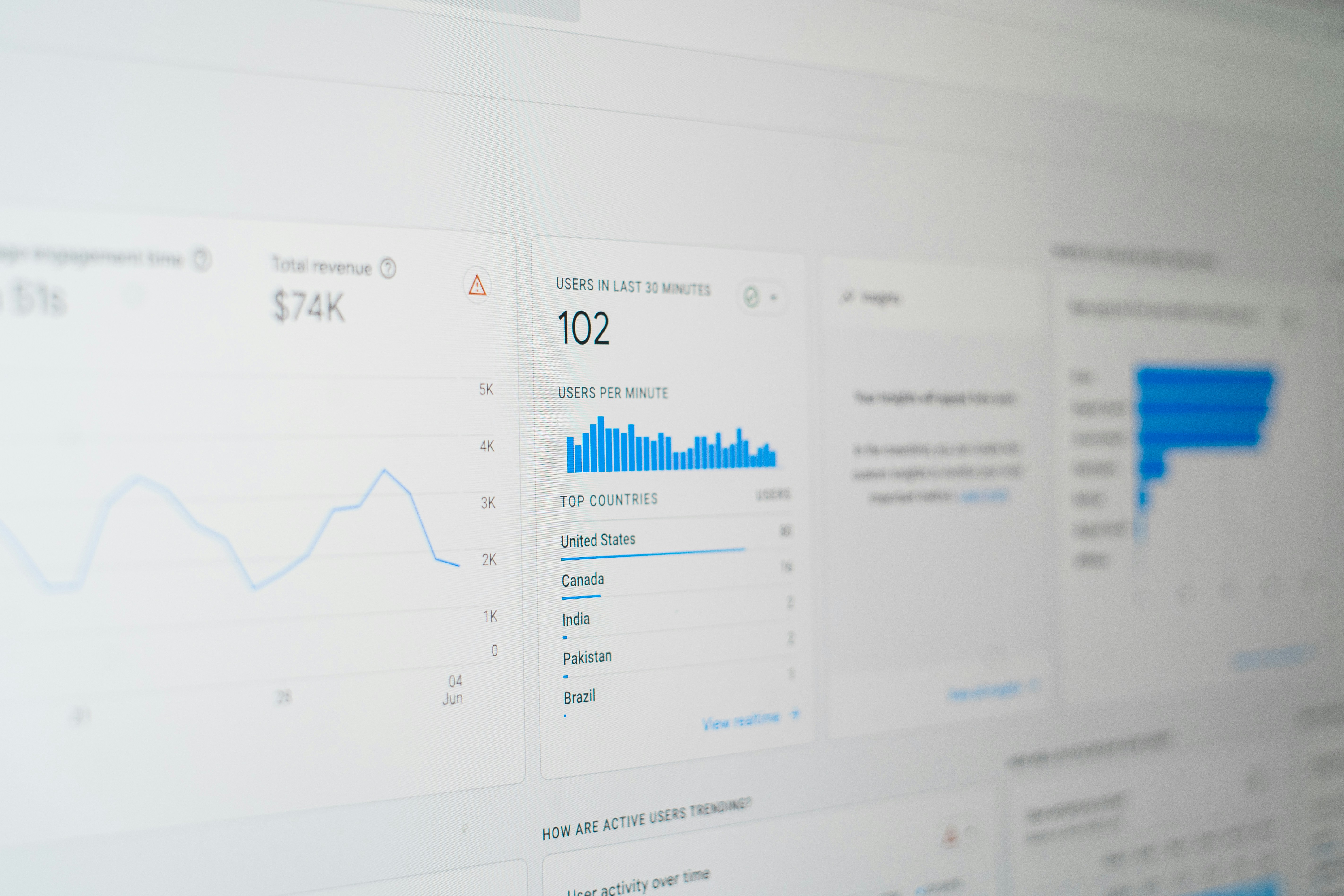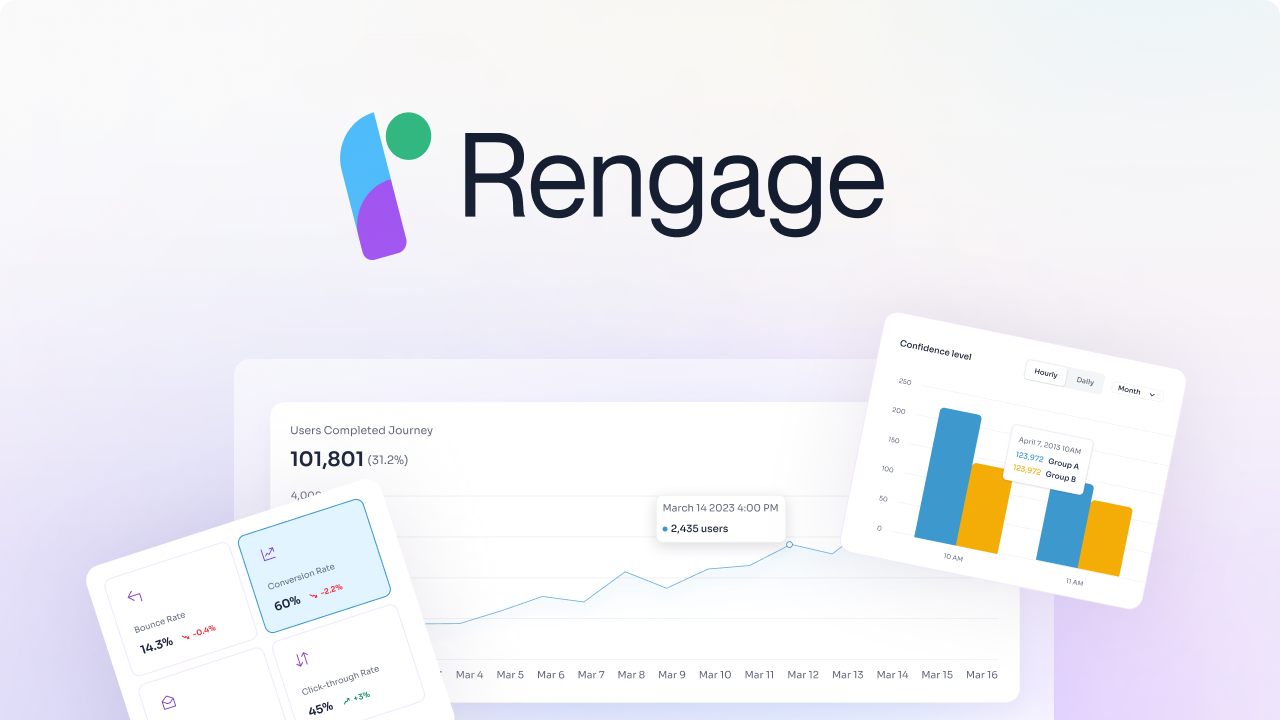Are you looking to dive deeper into customer segmentation analysis for your business? Understanding customer segments and their unique behaviors and preferences can unlock valuable insights that lead to personalized interactions. Using the best customer data platform, you can analyze customer journeys to enhance the overall customer experience efficiently, thus fostering growth and loyalty among your clientele.
Rengage's customer data platform drives loyalty and growth and provides seamless solutions for businesses hoping to better understand their customers. By analyzing customer journeys to enhance the overall customer experience and build personalized interactions, Rengage can help you achieve your goal of fostering loyalty and growth.
What is a Customer Data Platform?

A Customer Data Platform (CDP) is a tool that collects and unifies customer data from various sources into a single, centralized repository. This tool is essential for businesses looking to understand their customers better and deliver personalized experiences. With a comprehensive view of customer data, marketers can tailor their marketing strategies to meet their customers' needs and preferences.
9 Major Benefits of a Customer Data Platform

1. Create unified customer profiles
CDPs process data into customer profiles for single customer views. These profiles, also known as 360-customer views, consolidate insights like behaviors, purchase history, and interests into a comprehensive customer snapshot. This enables marketers to understand clients better and craft personalized experiences.
2. Eliminate data silos
Data silos arise when disparate teams hoard different customer data pieces, hindering a holistic understanding. A CDP consolidates data from varied sources, letting businesses access all customer data from every touchpoint at once, enabling informed decisions on customer experiences.
3. Improve personalization
Personalized digital experiences are now the norm. Unified customer views help brands ascertain the most relevant and personal experiences for customers. This includes understanding what clients want, when, and which touchpoints they prefer to engage through.
4. Increase data privacy and compliance
Data security is paramount with customers opting to share data for personalized experiences. CDPs ensure complete and up-to-date customer profiles, helping brands keep data secure and compliant with regulations.
5. Increase revenue
Using SCVs for personalized experiences boosts customer engagement and loyalty, leading to higher conversion rates and increased revenue. Personalized experiences can elevate revenues by 5-15% and enhance marketing efficiency by 10-30%.
6. Improve omnichannel customer experiences
CDPs amalgamate data from all touchpoints to create dynamic experiences corresponding to customer needs and behaviors. This allows brands to deliver personalized experiences across various channels, ensuring consistent and tailored customer journeys.
7. Increase efficiency
CDPs bridge gaps between departments and eliminate data redundancies by consolidating all data onto one platform. Continuously updated insights allow for creating experiences that resonate with customers, leveraging AI and automation for efficient operations.
8. Improve customer experience
Unified data translated into SCVs helps create personalized content that addresses customer needs. This fosters a sense of understanding, enhancing brand loyalty and customer lifetime value.
9. Use a single platform for B2C and B2B businesses
CDPs offer valuable insights for both B2B and B2C marketers, enabling personalized experiences tailored to any audience. Real-time CDPs empower marketers to create profiles from consumer and professional data seamlessly, enhancing collaboration and personalization efforts.
Streamlining Customer Journeys
We provide a comprehensive solution for managing and enhancing customer journeys, delivering insights and measurable outcomes with no code. We accelerate your customer journey from onboarding, activation to conversion and churn. Enabling customers to unlock revenue from their existing user.
With Rengage, you can get insights into your segments, run campaigns with an intuitive journey manager, and get insights to measure how your journeys impact users conversion through our Journey Moments and Journey Builder features.
- Journey Moments: insights into your micro-segments
- Journey Builder: intuitive multi-channel marketing automation
- Insights prediction and attribution.
Book a free demo to learn about how you can transform customer interactions into personalized experiences that drive loyalty and growth.
Related Reading
- Customer Data Infrastructure
- Omnichannel Analytics
- Customer Data Integration
- Predicting Customer Behavior
- Marketing Data Platform
- Customer Data Platform Vs Data Management Platform
- Customer Data Platform Use Cases
- Customer Data Platform Capabilities
- Customer Data Platform Tools
- How To Choose Cdp
4 Main Types of Customer Data Platforms

1. Marketing Clouds
Marketing Clouds refer to a suite of cloud-based marketing tools designed to help businesses manage and optimize their marketing efforts across a wide range of channels and platforms. Marketing Clouds are typically used by larger enterprises with significant marketing budgets and a complex network of digital touchpoints. These platforms often include features such as customer journey mapping, segmentation, automation, personalization, and analytics.
2. Smart Hubs
Smart Hubs are like a central hub for a company’s marketing technology. Smart Hub CDPs consolidate data from various sources and channels, such as CRM, ERP, and social media, and make it accessible and actionable. Smart Hub CDPs help marketers create more targeted and personalized campaigns by providing a comprehensive view of their customers and their interactions with the brand. These CDPs are especially useful for companies looking to unify their data sources and break down data silos.
3. Marketing Data Integration
Marketing Data Integration CDPs place data first, with robust API capabilities. These CDPs help businesses integrate data sources, such as first-party, second-party, and third-party data, to create a unified customer view. Marketing Data Integration CDPs make connecting and analyzing customer data easier, helping businesses craft more effective marketing strategies and campaigns.
4. Engines and Toolkit
Engines and Toolkit CDPs are built by businesses when the available CDP options are deemed insufficient. Some companies prefer to build their CDPs from scratch or customize existing solutions to meet their unique needs. This approach allows businesses to create a CDP that aligns perfectly with their specific requirements and objectives. Engines and Toolkit CDPs are ideal for companies that have sophisticated data management needs or operate in highly regulated industries.
Top 5 Features to Look for in a Customer Data Platform

1. Real-Time Data
One essential feature businesses should look for in a Customer Data Platform is real-time data processing capabilities. This feature ensures that customer profiles and data segments are updated within a few seconds. With real-time data processing, businesses can personalize customer experiences in real-time, leading to increased customer engagement and satisfaction.
2. Behavioral Triggers
Another crucial feature when evaluating a CDP is its ability to create customer profiles based on behavior across multiple channels. This feature allows businesses to understand better their customers' preferences, interests, and behaviors, enabling them to create more targeted and personalized marketing campaigns and experiences. By leveraging behavioral triggers, businesses can enhance customer engagement and drive conversions.
3. Analytics and Insights
CDPs with robust analytics and reporting capabilities are invaluable for businesses seeking actionable insights from their customer data. These platforms should provide businesses with the tools to analyze customer data, segment customers based on various criteria, and derive meaningful insights to drive their marketing strategies. By leveraging analytics and insights, businesses can make data-driven decisions, optimize their marketing efforts, and enhance the overall customer experience.
4. Secure and Compliant
Data security and compliance are paramount considerations when choosing a Customer Data Platform. CDPs must adhere to regulations such as the General Data Protection Regulation (GDPR) and the California Consumer Privacy Act (CCPA) to protect customer data and privacy. Businesses must prioritize CDPs with robust security measures to safeguard customer data and ensure compliance with relevant data protection laws.
5. Integration Options
Businesses should evaluate the integration options offered by different CDP vendors. A best-in-class CDP should seamlessly integrate with the applications and marketing automation platforms businesses already use or plan to use. By choosing a CDP with extensive integration options, businesses can streamline their marketing workflows, consolidate customer data from various sources, and create a unified view of the customer. Integration options play a crucial role in enhancing the efficiency and effectiveness of a CDP, enabling businesses to leverage their existing technology stack and maximize their ROI.
Related Reading
- Customer Retention Automation
- Customer Data Integration Best Practices
- Real Time Customer Segmentation
- Chat CDP
- Customer Data Platform Implementation
- Benefits Of A Customer Data Platform
- Customer Segmentation Solutions
- Omnichannel Measurement
- AI Customer Segmentation
- AI CDP
- Customer Data Platform GDPR
- Customer Data Platform Costs
- CDP Personalization
28 Best Customer Data Platform Vendors
1. Rengage: A Comprehensive CDP Solution

Rengage offers a comprehensive solution for managing and enhancing customer journeys. The platform delivers insights and measurable outcomes with no code. It accelerates customer journeys from onboarding to churn, assisting in unlocking revenue from existing users.
Key features include:
- Insights into segments
- Running campaigns with an intuitive journey manager
- Measuring the impact on user conversion through Journey Moments and Journey Builder features.
The Journey Moments feature provides insights into micro-segments, while the Journey Builder offers intuitive multi-channel marketing automation. Insights prediction and attribution are also included in the platform. Rengage is ideal for businesses seeking to transform customer interactions into personalized experiences that drive loyalty and growth.
2. MVF
MVF operates a marketing platform that focuses on customer acquisition. Using data obtained directly from its clients’ customers on their own channels, the company provides industry-specific customer insights for B2B clients. Its clients across in industries like logistics, accommodation, health, food and beverage, education and business services.
3. Segment
Segment is a CDP that helps businesses collect, clean, synthesize, and activate first-party data across different touchpoints, such as Facebook, email, and website. Through a single API, Segment can also connect customer data from different business departments, such as marketing, sales, service, and web analytics.
4. Optimove
Optimove’s Relationship Marketing Hub brings customer data together in a single customer view. The GDPR- and ISO-compliant platform combines first-party data, third-party data, on-site/in-app user activity, and campaign response history.
5. Totango
Totango enables users to connect and view data from customer data streams, including contract and transactional data, support tickets, and demographic and behavioral data. You’ll also be able to access and compare real-time customer health data with other metrics like NPS (Net Promoter Score) and CSAT (Customer Satisfaction Score).
6. Bloomreach
Bloomreach’s CDP, Bloomreach Engagement, offers a single customer view, online and offline data tracking, and customer analytics, such as on-site data, backend data, and offline data. The platform also leverages machine learning to make predictive recommendations, like ranking customers based on their actions, such as their likelihood to make a purchase.
7. Insider
Insider can connect data across multiple channels, such as apps, websites, email, and CRM, predict behavior like customer intent using its AI engine, and create personalized experiences at customer touch points. Customer profile management is centralized with Insider’s journey orchestrator, Architect.
8. Tealium AudienceStream CDP
Tealium AudienceStream enables companies to construct detailed customer profiles, with features like:
Identity resolution
Collecting and matching customer data points across different platforms, devices, and browsers
Cross-channel audience management
Create a solid data foundation to organize audience data
9. Blueshift
Blueshift unifies and organizes first-party customer data in a single customer view. Features include cross-device identity resolution, real-time data, and customizable datasets.
10. Microsoft Dynamics 365 Customer Insights
This real-time CDP combines transactional, behavioral, and demographic data to create comprehensive customer profiles. Features like sentiment analysis enable you to identify opportunities to improve customer experience.
11. Oracle Unity
Oracle Unity combines online, offline, first-party, second-party, and third-party data into a real-time customer view. Identity resolution enables you to connect individual identities across various channels. Data models built for different industries lets you get granular.
12. Emarsys
Emarsys connects sales, product, and customer data to provide a holistic view of the customer. The platform helps you synthesize historical and real-time data to provide personalized experiences for your customers.
13. Enigma
Enigma uses proprietary machine learning and AI technology to comb vast data sets for business intelligence information, which is used in various contexts including B2B sales and marketing—the Enigma Sales and Marketing platform guides targeting, acquisition, segmentation and engagement in B2B accounts.
14. ActionIQ
ActionIQ’s composable customer data platform gives enterprise brands control over the storage, access and use of their customer data. Its solutions allow them to unify data to build comprehensive profiles for every customer, target the right audience segments and customize and manage the customer experience. The company serves brands in industries such as retail, financial services, media and hospitality.
15. Appier
Appier provides a customer data platform that utilizes a no-code AI feature that makes it easier for marketing teams to identify valuable customers, develop personalized ad campaigns at scale and anticipate user needs. The platform aggregates customer information from various data sources like the user company’s customer relationship management software, social media websites and marketing software, and then creates individual customer profiles.
The AI can then surface behavior patterns of the company’s profitable customers and use that information to identify future customers for companies to target. Users can build additional machine learning models with a few clicks via its tagging system.
16. BlueConic
BlueConic is another customer data platform that allows companies to centralize customer data, create individualized customer profiles and curate personalized marketing campaigns. In addition to those services, its AI allows users to run data models to assess which customers are likely to buy their products, customer similarities, and lifetime value.
The platform also tracks when customers abandon their shopping cart in real-time and allows users to trigger personalized content to lure them back. For early-stage companies or those new to CDPs, BlueConic also offers a nine-question assessment designed to help them assess their readiness for its platform. Questions are designed to help companies evaluate their customer data accuracy, accessibility, and utilization, all key ingredients to get the most out of a CDP.
17. FirstHive
Like other customer data platforms, FirstHive helps companies centralize customer data from disparate sources and run analysis to find high-value customers and design personalized campaigns to convert them. It also specializes in helping companies in manufacturing, retail, finance, and digital content identify and convert customers. For retail firms, users can craft product recommendations, run loyalty campaigns and deliver a personalized shopping experience. Manufacturers can collect data to identify buyers to target across each stage of the supply chain, from wholesaler to distributor to after-sale services, run localized campaigns and gather insights on the product to shape its development.
Digital media companies, meanwhile, are able to leverage its AI tool to assess how customers engage with its content. And banking firms can tap into its anti-fraud and predictive AI to ensure they’re building the right customer base. For marketers looking to stay on top of the latest marketing strategies, FirstHive also organizes frequent webinars on customer engagement strategies.
18. Klaviyo
Klaviyo provides a flexible customer data platform for retail companies that integrates with more than 200 marketing tools including e-commerce website Shopify, review website Reviews.io and shipping software AfterShip. In addition to viewing updated customer profiles in real-time, users can grow their customer base via automated email and SMS marketing campaigns. Users can also segment their customer bases around topics like predicted customer lifetime value, specific purchases and discount code usage to send targeted content.
Klaviyo is beginner-friendly, offering live workshops on using its platform and insights on the latest marketing techniques. It also offers a flexible pricing structure that charges users based on how many emails or SMS messages they send rather than a monthly or annual fee.
19. Lytics
Lytics is a customer data platform for retail, media, B2B software and financial services companies. Lytics allows users to access customer data straight from a data warehouse like Google BigQuery or Snowflake and then turn it into a personalized marketing campaign.
Users can segment their audiences, tap into its predictive analytics to identify buyers at risk of churn and craft marketing campaigns that span multiple channels like social media, SMS and email. Marketers can also tag content to trace user behavior, run account-based marketing campaigns based on that behavior and identify cross-sell opportunities — key features for any subscription-based software company.
20. Ortto
Ortto provides a customer data platform designed specifically for software startups and nonprofits. In addition to helping users unify their customer data, they can create a custom set of qualifying activities to track and then automatically funnel customers to a sales or product-led path based on their actions.
Ortto also uses AI to track when customers engage with your marketing content, what time they most often interact with it and what subject lines perform best. For nonprofits, services include the ability to attribute revenue to each funding campaign, engage with donors across multiple channels and run A/B testing for each campaign.
21. Planhat
Developed with customer success and product-led growth in mind, Planhat offers a customer data platform that aims to help companies provide existing customers with a better experience. The platform allows users to create onboarding plans for customers, track health scores by customer segment to identify churn risks, develop playbooks for high-touch customers and evaluate the success of those engagements.
For product-led growth companies, users can also track the customer journey and get upsell alerts when a customer shows qualifying behavior. Planhat also takes several steps to protect customer data, including a three-layered permissioning process, regular penetration testing and maintaining SOC 2 Type II certification.
22. SALESmanago
SALESManago provides a suite of services designed to help e-commerce companies grow their businesses. The customer data platform allows users to build 360-degree customer profiles, use AI to anticipate customer behavior and identify product recommendations, and automate marketing activity based on customer behavior.
Users can also collect less obvious data like how long a customer hovers over an image, what elements they click on (like changing a product color or size), and how much time they spend scrolling on the website. Those insights are then used to inform product recommendations and marketing engagement. Other features include search engine optimization, marketing campaign management and multi-channel outreach resources.
23. Simon Data
Simon Data helps marketing teams work more efficiently and create personalized customer experiences across multiple channels. Similar to other customer data platforms, it aggregates data from disparate marketing tools so that users can build in-depth customer profiles. From there, users can send real-time messages based on customer actions or set triggering events that automatically send outreach when a user exhibits that behavior.
The platform also helps users take advantage of anonymous web traffic, matching customer activity with known profiles that can be used to send targeted ads. Simon Data integrates with over 50 tools, including BigCommerce, HubSpot and Salesforce.
24. Treasure Data
Treasure Data provides a customer data platform that aims to help marketing, sales and customer service deliver a better customer experience. The platform can create unique customer profiles, make it easier to segment audiences with one click and utilize AI to predict the best marketing campaign to capture that customer. It also enables sales teams to identify qualified customers through data rather than lengthy BANT-style questions, project their expected lifetime value as a customer based on their current behavior and data and provide insights for personalized outreach.
Treasure Data aims to improve customer service by funneling customers to the first available service agent, providing that agent with real-time customer insights so they can properly help them and collecting service intel back into the system. Companies needing fast product adoption can choose from a selection of pre-built applications to run anything from real-time recommendations on next best action to customer lifetime value predictions.
25. Zeotap
For global companies, finding a customer data platform that keeps up with the rapidly evolving data privacy regulations around the world can be challenging. Zeotap offers a CDP that prioritizes data security and staying on top of those regulations with multiple ISO certifications, a GDPR certification of compliance and Cloud Security Alliance compliance.
Beyond its security efforts, Zeotap’s platform allows marketing teams to tap into their trove of customer insights from multiple platforms, create customer segments and set up personalized marketing campaigns based on how those customers are likely to act. The platform serves users in the banking, retail, insurance, travel, telecom and consumer packaged goods industries.
26. Zeta Global
Marketers need a trove of data to predict what customers want and deliver tailored marketing to them. Zeta delivers on that with its customer data platform. The software collects data from the company website, social media, and other marketing tools and then crafts unique customer profiles, identifies preferences of anonymous website visitors, and provides real-time scoring to measure the quality and churn risk of the customer.
Zeta also uses predictive AI to help marketers deliver personalized content. Its low-code interface, meanwhile, makes it easier for marketers to create workflows, segment customers and run custom data reports with a click of the button.
27. SAP Customer Data Platform
SAP is an enterprise-level customer data platform that provides unified customer views and real-time insights to enhance segmentation, uncover trends, and fuel personalized customer experiences. Acquired in 2017, SAP CDP focuses on enterprise organizations across several industries, offering functionalities well-suited to managing large volumes of customer data.
SAP CDP connects and resolves data from various sources in your organization to prevent data silos and ensure access from a central access point. The platform also provides real-time customer data, ensures smart segments, and delivers hyper-personalized experiences to deepen your understanding of customers and gain rich insights into their interactions with your brand.
28. mParticle
mParticle helps brands build a single view of their customers, create segments, and utilize predictive analytics. mParticle also offers schema management and transformation tools that help developers manage data quality. This CDP supports lots of data integrations with tools for product, development, and marketing teams, including Insider, Google Analytics, BigQuery, and Amazon RedShift.
5 Steps for Choosing the Best Customer Data Platform

1. Get stakeholder buy-in
CDPs ingest data from different departments of your organization. For this reason, getting buy-in from internal stakeholders is vital when choosing your CDP. Your allies should come from the sales, IT, customer success, marketing, and finance departments.
Including IT in the discussion seems obvious. This department knows if a CDP's SDKs or APIs fits your company's tech stack. Discussing a CDP with your organization as a whole allows you to ensure multiple types of data are collected.
For example:
- Sales teams use a CRM platform to manage their pipeline.
- Customer success teams use onboarding tools to discuss with new clients.
- Marketing teams use analytics and attribution tools to track metrics like MQLs.
- Product teams use analytics data to improve the user experience of your web properties.
Getting input from these teams will help you understand what they hope to get from a CDP. This will also improve companywide adoption of your CDP.
2. Outline your core challenges or use cases
What your company expects from a CDP likely goes beyond the general function of consolidating data. Outlining use cases specific to your brand will help you find your ideal customer data platform.
While this is the responsibility of your stakeholders, you'll need to identify common themes. This allows you to find and evaluate CDP vendors that can solve the challenges you outlined.
Some common CDP use case cases are:
- Customer data unification.
- Enhanced personalization.
- Multichannel messaging.
- Having actionable analytics.
After outlining your use cases, reach out to your peers in companies that use a CDP. Your goal is to learn about the CDP they use to address similar challenges. This will help you build a shortlist of CDP solutions.
3. List the tools you need to connect to your CDP
Knowing the tools you'll connect to your CDP will help evaluate vendors and assess their integrations.
For instance, if one of your goals is to have a cohesive multichannel messaging strategy, you may need Google Analytics, live chat tools, business intelligence tools, and advertising tools like Facebook.
The use cases outlined in the previous step are also useful here. They can help you identify the tools you need. Make sure your CDP integrates with pre-existing systems. If a CDP is incompatible, rule it out.
4. State the capabilities of your ideal CDP
Beyond integrating with your existing tech stack, it's essential to consider a CDP's core capabilities. For instance, if your company handles sensitive customer data, an ISO 27001 or SOC 2-certified CDP is ideal.
Other requirements to look out for are:
- Data governance.
- Level of quality enforcement.
- GDPR and CCPA compliance.
- Identity resolution features to get a 360-degree view of your customer journeys.
- CDPs with control over different roles and permissions.
- The volume of data you can store.
5. Compare CDP vendors
Find suitable vendors by assessing colleagues' recommendations, checking pricing pages, and reading CDP comparison pages. G2 and Capterra will be helpful resources as you search. All CDPs aren't created equal. Some may work best for small businesses and others for midmarket and enterprise companies. So narrow your search for a CDP accordingly.
After finding some excellent CDPs, ask your stakeholders to rate the CDP's ability to meet their team's requirements. They could even take the CDP for a test drive by using a free trial. From there you can find a solution that works best.
Create Personalized Experiences That Drive Loyalty and Growth with Rengage — Book A Free Demo Today
Rengage provides a powerful solution for managing and enhancing customer journeys. Our platform is designed to deliver actionable insights and measurable outcomes without coding. With Rengage, you can accelerate customer journeys from onboarding and activation to conversion and churn. We enable you to unlock revenue from your existing user base, providing the tools you need to drive growth and foster customer loyalty.
Insights into Segments
Rengage lets you gain valuable insights into your customer segments, helping you understand their behaviors and preferences. By better understanding your audiences, you can tailor your marketing efforts to suit their needs, ultimately driving higher engagement and conversions.
Intuitive Journey Manager
Our platform features an intuitive journey manager that simplifies the process of creating and launching campaigns. With Rengage, you can easily design multi-channel marketing automation sequences that drive personalized interactions and engage your audience at every touchpoint.
Journey Moments
One of our standout features is Journey Moments, which provides insights into micro-segments of your customer base. By understanding the nuanced behaviors of different customer groups, you can create more targeted and effective marketing strategies that resonate with each segment.
Journey Builder
Our Journey Builder feature enables you to create personalized customer journeys that drive meaningful interactions and deliver value to your audience. By leveraging insights and data from Rengage, you can design campaigns that align with customer needs and preferences, boosting overall conversion rates.
Insights, Prediction, and Attribution
At Rengage, we understand the importance of data-driven decision-making. Our platform provides insights, predictions, and attribution models that help you understand the impact of your customer journeys on conversion rates. By leveraging these capabilities, you can optimize your marketing strategies and drive higher ROI.
Book a Free Demo
If you're ready to transform your customer interactions into personalized experiences that drive loyalty and growth, book a free demo with Rengage today. Our platform is designed to help you unlock the full potential of your customer data and deliver outstanding results.
Related Reading
- CDP Marketing Automation
- Customer Data Platform Vs Marketing Automation
- Ecommerce Cdp
- Totango Competitors
- Centralized Marketing Data
- Customer Data Management Best Practices
- Segment Alternatives
- Blueconic Cdp
- Emarsys Competitors
- Actioniq Competitors
